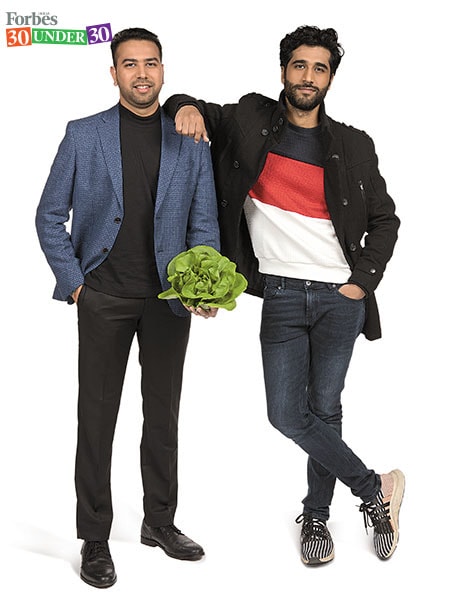
Triton Foodworks: The urban farmers
The self-funded startup uses hydroponics and low-cost, internet-enabled smart farms that use 300 times less land; it clocked in Rs1 crore turnover last fiscal
 Dhruv Khanna (left) and Ullas Samrat, co-founders, Triton Foodworks
Dhruv Khanna (left) and Ullas Samrat, co-founders, Triton FoodworksImage: Amit Verma
Ullas Samrat | 29
Dhruv Khanna | 29
Co-founders, Triton Foodworks
Hydroponics, a method of growing plants without soil, requires 60 to 80 percent less water, and no pesticides. It is possibly the next big thing in sustainable agriculture, and a bunch of youngsters figured this out in 2014.
Despite not having a background in agriculture, Mumbai-based Deepak Kukreja and Delhi-based Ullas Samrat and Dhruv Khanna found their calling in hydroponics. The self-funded trio deployed their system on 1.25 acres and launched Triton Foodworks in 2015, and have since upgraded to low cost, internet-enabled smart farms that use 300 times less land compared to conventional farming.
“We had to learn from our mistakes at every step,” says Samrat, adding that they decided to develop technology in-house instead of outsourcing it to reduce cost.
The Delhi-based startup clocked in a turnover of ₹1 crore last financial year, and by the end of FY20, is hoping to cross ₹1.75 crore. The company has two revenue streams: Selling produce to 18 stores in Delhi-NCR under the brand ChopChop, and setting up hydroponic farms for clients (retail, institutional, restaurants etc) and sharing their revenues. “ChopChop brings 85 to 90 percent of our total revenue,” says Samrat.
Manish Khera, regional category manager (North)-fresh produce, Foodhall India, says Triton’s produce usually sees a lot of repeat sales. “We’re witnessing immense growth in the category. New customers opt for the range on a daily basis owing to its year-round supply.”
See the full Forbes India 30 Under 30 list for 2020 here
Triton is expanding to the US, with their first project in Nashville, Tennessee, to be completed in March. Their clients range from family offices to bankers interested in sustainable agriculture. Next year, the company wants to expand ChopChop to Mumbai. “We are exploring the B2C model, where farm fresh produce will be delivered to customers. A pilot will be rolled out in April,” says Khanna.

(This story appears in the 30 November, -0001 issue of Forbes India. To visit our Archives, click here.)





